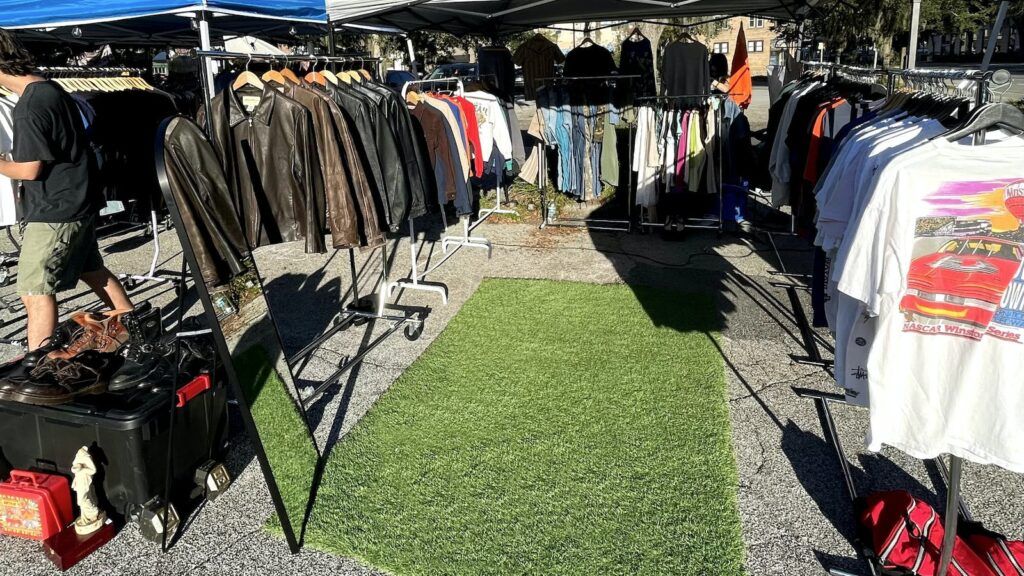In an ordinary garage, one would hardly expect to find racks of lacey lingerie slips, distressed denim jeans or sleek black leather jackets. However, for one Gainesville business owner, vintage fashion consumes almost every corner of his home.
Inspired by the rise of thrifting and vintage pop-up markets, 22-year-old Silv Vences has turned his passion for true vintage and grunge clothing into a successful online business. Since starting the thrifted fashion business Grey Metal in his home a year ago, Vences has established a personalized style and sold over 350 pieces.
Vences started the business in October 2022 by purchasing pieces from thrift stores and selling them at vintage pop-up markets, such as the Gainesville Florida Vintage Market and on the clothing resale app Depop.
Despite the long hours and frustration of searching for authentic vintage clothing, Vences said he was inclined to start the business because he struggled to find pieces at pop-up markets that fit his grunge style.
“True vintage is a style that I like to cater towards,” he said. “But you have people that are really into the Y2K scene, the ’90s and streetwear. When I saw that over there, I didn’t find my style. I didn’t find cool leather jackets that had cool details.”
Vences’ inspiration for the pieces he sells is rooted in his passion for finding thrifted treasures in a world that is overcome by fast fashion.
With the rise of fast-fashion and style trends, many people fall into a cycle of purchasing clothing to fit a new style, throwing them out and repurchasing new items that are considered “trendy” for the time, he said.
According to Vences, this overconsumption of clothing can negatively affect one’s wallet and the environment.
However, thrifting offers a solution by allowing people to remain financially and environmentally conscious while creating their own sense of style and expression, he said.
“Our generation is so focused on, ‘I’m so tired of this style, so I’m going to throw it away and get something new,’” Vences said. “It wasn’t like that back then. People wore their clothes until they were actually gone, and I want that same mindset to come back.”
Noah Berdugo, a 21-year-old Florida Atlantic University graduate student, has been thrifting for years at Florida vintage markets. Berdugo said he opts for thrifting because he believes the quality of clothing items today has gone down significantly.
“I think when you’re thrifting, you’re looking at higher quality products,” he said. “If something looks cool today from back then, it’s timeless, and you have a guarantee with that which you don’t get with things now.”
Enjoy what you’re reading? Get content from The Alligator delivered to your inbox
The constant pressure to purchase new clothing items can also become incredibly costly over time, Vences said.
“I don’t like how people just want to buy and buy,” he said. “Why would I just buy it to wear it once out of the year? I would rather buy a jacket that I’m going to wear five times out of the week. I don’t want to waste my money on a piece.”
This mindset has motivated Vences to curate his brand to sell more essential vintage pieces, including items that customers can wear every day and keep in their closets for years before passing down.
Beyond the financial benefits of thrifting, Vences said purchasing used clothing is one way to promote a safer and cleaner environment.
Eighty-five percent of textiles are thrown out each year and 10% of the planet’s carbon emissions come from fashion production. The pollution created from clothing production dries up water sources and sends microplastics into rivers and oceans, according to the United Nations Economic Commission for Europe.
“It’s better to just reuse and rebuy from people,” Vences said. “There’s already so many clothes in the world to clothe everyone for hundreds of years.”
For those interested in thrifting or collecting vintage pieces, Vences recommends starting one’s own thrifting business.
However, Vences said the industry can be challenging and competitive, especially when starting out at vintage pop-up markets.
“You’ll have weeks where you’re posting things and not getting sales,” he said. “There will be some dry seasons … I’ll see people literally put the stuff up there, be there for five hours and pick up all the stuff that they had before.”
To combat the competitive nature of the thrift industry, Vences suggests creating a specific clothing inventory for each event and catering to the crowd it brings.
Vences said aspiring thrift business owners should also create a smaller inventory that represents their style rather than selling every item that looks vintage or focusing too much on a fancy presentation. This can benefit people who want to start a fashion business yet have limited space for storing clothing and equipment.
“Have your style that represents you,” he said. “First, just get pieces that you like before you buy everything … Don’t focus too much on aesthetics, just cater really towards your clothes.”
Similar to Vences, best friends Sarah Butler and Taylor LeBlanc transformed their love for thrifting into Value Vintage, a thrift business that focuses on selling sustainable, inclusive and affordable clothing.
Butler said vending at events such as the Florida Vintage Market can play a key role in running a successful business.
“The Florida Vintage Market has helped us so much with our business,” she said. “They’ve given us a great platform and way to showcase our curated clothing and sell them to the public without it all having to be online.”
Butler also recommended truly dedicating oneself to the business by maintaining an active presence on social media and showing one’s passion.
Whether starting a vintage fashion, looking through a family member’s closet or purchasing items from Depop, reusing clothing allows people to protect the environment while creating a timeless and stylish look.
Vences hopes that by selling true vintage pieces that reflect his edgy style, his business may encourage others to become more involved in reusable clothing.
“It’s so cool hearing somebody our age say, ‘Yeah, this is my dad’s t-shirt,’” he said.
Contact Alexandra Burns at [email protected]. Follow her on Twitter @alexaburnsuf.
The Independent Florida Alligator has been independent of the university since 1971, your donation today could help #SaveStudentNewsrooms. Please consider giving today.

